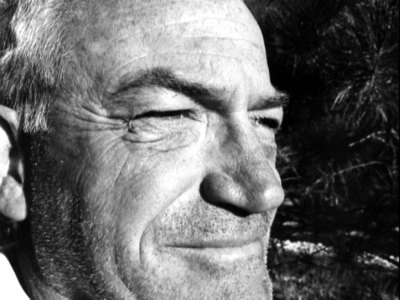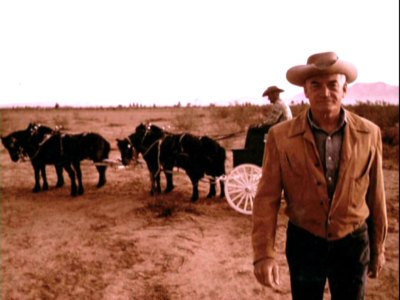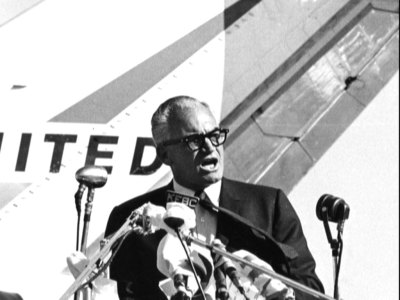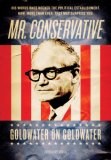| Reviews & Columns |
|
Reviews DVD TV on DVD Blu-ray 4K UHD International DVDs In Theaters Reviews by Studio Video Games Features Collector Series DVDs Easter Egg Database Interviews DVD Talk Radio Feature Articles Columns Anime Talk DVD Savant Horror DVDs The M.O.D. Squad Art House HD Talk Silent DVD
|
DVD Talk Forum |
|
|
| Resources |
|
DVD Price Search Customer Service #'s RCE Info Links |
|
Columns
|
|
|
Mr. Conservative: Goldwater on Goldwater
Zeitgeist Films has released Mr. Conservative: Goldwater on Goldwater, a documentary on the legendary Republican Senator from Arizona. Co-produced by Barry Goldwater's granddaughter, CC Goldwater, Mr. Conservative: Goldwater on Goldwater attempts the rather ridiculous transformation of the unsuccessful 1964 presidential candidate and author of The Conscience of a Conservative into a rebellious liberal, while hinting that his personal life may have been troubled. Perhaps significantly, no screenwriting credit is given, but one must assume that despite the film's listing of Julie Anderson as the nominal director, CC Goldwater is the main driving force behind the film. She narrates here, often framing the examination of her grandfather's political and social legacy in personal terms, so it is with her that the film largely rises or falls. I found her argument that Goldwater was a closet liberal slanted and selective, and her teasing about his personal life - the main contention being that he was an absent, distant father - largely unsubstantiated.

Goldwater, a maverick Senator from the state of Arizona, is often credited with jump-starting the resurgence of the conservative movement in America, when he was drafted by a grassroots campaign in 1964 to run for the presidency. The author of the best-selling The Conscience of a Conservative had become a focal point for conservatives in the country who felt abandoned by their minority party. Goldwater, never afraid to speak his mind (which is about the last thing you should do in a presidential campaign if you want to win), was painted as a right-wing kook by the largely liberal press, and a dangerous ideologue who would bring the world to the brink of nuclear holocaust should he be elected. He lost in a landslide to Lyndon Johnson (some say he would have fared far better had he run against his Senatorial friend, John Kennedy), and returned to the Senate in 1968. The grassroots campaigners, as well as the voters, turned to then California governor Ronald Reagan as their new hope, while Goldwater's increasingly frank disagreements with the so-called "religious right," as well as his views on gays in the military, largely isolated him from most conservative movers and shakers in the 1980s and 1990s.
There's no question that Mr. Conservative: Goldwater on Goldwater has its own political agenda: to claim the former Senator's ideology as essentially "liberal," not conservative; or more accurately, not "conservative" as that word is applied today by the press and the Democrat Party. It's not surprising that such an attempt would be made in today's political atmosphere, with a looming presidential election where candidates on both sides seek to redefine themselves and their perceived ideologies, to maximize their electability. That's why Mr. Conservative: Goldwater on Goldwater is filled to the brim with left-of-center liberals extolling the virtues of hawkish Goldwater. No less than Hillary Rodham Clinton, Al Franken, Julian Bond, Walter Cronkite, Ben Bradlee, James Carville, Alfonse D'amato, Bob Schieffer, Helen Thomas, Andy Rooney, and even Ted Kennedy making nice for the cameras about Goldwater (even Norman Lear shows up in a bonus interview). Where are the conservatives, you may ask? Well, we hear from George Will a couple of times. John Warner and John McCain pop up occasionally. John Dean shows up, too, but to call him a "conservative" is to laugh, so he doesn't even count. And that's it.
The very fact that the producers of the film felt the need to have that ridiculously skewed ratio of liberals to conservatives define Goldwater's legacy pretty much throws out any semblance of fairness the film may have claimed, while clearly indicating the biased intention of the filmmakers. This is further illustrated by the selective nature of the film's examination of Goldwater's career. The entire film is slanted to present an overwhelming argument that Goldwater's conservatism was a "good" conservatism, and by implication, that today's is "bad." Tellingly, no one interviewed for the film really discusses Goldwater's "conservatism." To all the liberals interviewed, he's a great guy because he "spoke his mind," and he had "integrity," but no one wants to put it on the line about his actual politics, because if they did, they'd have to admit that the majority of Goldwater's political beliefs were diametrically opposed to their own liberal ones.
The film, in what it obviously believes is some kind of "smoking gun," reveals (although anybody watching the news back in the '80s and '90s already knew this) that Goldwater didn't like the so-called "religious right," wasn't against abortion, and was against banning gays from the military. Supposedly, those three positions - importantly, positions made public after Goldwater was elected to his final term in office - are enough to convince everyone that Goldwater was some kind of closet liberal, and thus, "okay" as a "good" conservative. What the film doesn't do is make the case strongly enough, that Goldwater's positions on these issues were largely ones of constitutionality. Goldwater's political views could be summed up first, last and everything in-between as: hands off, government. Goldwater felt an individual was responsible for his own life and his own prosperity, and he despised the welfare, entitlement society that was rapidly gaining foothold in America. Knowing that, how can anyone watching Mr. Conservative: Goldwater on Goldwater rationalize that long, long list of liberals speaking on behalf of Goldwater?

Of course, the film couches its intentions by having those interviewees discuss only his integrity, his forthrightness, and his honesty, which naturally makes them look tolerant and "forgiving." However, the film's notion that somehow the conservatism of Goldwater was in any way better or more acceptable to today's liberals, is frankly nonsense. None of those interviewed would buy one bit of Goldwater's ideology if he was in the Senate today (in fact, he'd more than likely be demonized in the press), and the instances where Goldwater's personal politics intersect with supposedly "liberal-only" issues like abortion and gays in the military, wouldn't cut any slack with the press and the Democrats today, either (just look at Giuliani's treatment in the press if you don't believe that). It's always easy for ideological opponents to talk favorably about an adversary when they're no longer with us.
The film doesn't even play fair the events surrounding Goldwater's career. For instance, much is made about the danger of Goldwater's hawkish military stances during the 1964 presidential campaign. But when it comes time to mention the escalation of the Vietnam conflict after Goldwater lost the election, the film decides to use Al Franken, a former gag writer for Saturday Night Live, to pass off a joke about how his friend voted for Goldwater, and the predictions about widening the Vietnam war (if Goldwater had actually been elected) came true. Of course, the film won't let him finish by admitting who widened that war, saying the name "Democrat President Lyndon Johnson" because that wouldn't fit in with the Muzak of the film's game plan (his pathetic joke, and his laughter after delivering it - considering how many U.S. soldiers died in Vietnam due to Johnson's part in the escalation - is tasteless in the extreme). As well, quite a bit of time is devoted to Goldwater's involvement with the Watergate scandal, and his hatred for Richard Nixon, again for the purposes of making him an "acceptable" conservative. But almost no time is spent on his involvement with Ronald Reagan - except of course to personify the entire "religious right," whatever that imprecise at best label means, solely in the guise of Jerry Falwell, detailing Goldwater's feud with him. Indeed, the film says nothing about Goldwater's conservative political efforts in his own state. If the filmmakers' had, their central thesis that Goldwater was a closet liberal would go right down the tubes.
Even less successful is the film's weak attempt to explore Goldwater's personal life, as to what kind of father he was or wasn't. CC Goldwater states at the beginning of the film that she wanted to understand why he gradually drifted away from the family. If true, I would think that was obvious to most viewers without explanation: being a leading United States Senator can be a time-consuming job, and as anyone knows who has climbed to the top of his or her profession, it takes a tremendous amount of work to get there, with families often suffering as a result. However, the film goes even further, discussing Goldwater's distance with his children, and his inability to show direct affection to them. His son, Barry Goldwater, Jr. breaks up during the interview, obviously overcome with emotion when discussing how he felt he never made his dad proud. But then, he immediately reverses that, and says that perhaps his troubles in life - which he brings up but then refuses to detail - were his own fault, and not his father's. Listening to the Goldwater children discuss their supposedly distant dad, I have to admit that he didn't sound all that bad to me, quite frankly. I would suggest the Goldwater kids pick up any daily newspaper, and read some of the stories about truly "distant" fathers out there, and what they get up to (and that's putting it kindly). It's a sub-theme brought up at the beginning of the film that goes absolutely nowhere, is sketchily documented and then abandoned, and finally comes off as merely titillating grist to further sell the film.

The DVD:
The Video:
The full frame video image for Mr. Conservative: Goldwater on Goldwater looks excellent, with crisp, sharp images and good color values. I saw no significant compression issues.
The Audio:
The English 2.0 stereo soundtrack is perfectly fine for this presentation. English subtitles are available, too.
The Extras:
There are over 30 minutes of extra interviews with Hillary Rodham Clinton, John McCain, Al Franken, Robert MacNeil, Bob Schieffer and Norman Lear, discussing Goldwater. Also included is Goldwater's spectacular 10-minute short, Shooting Grand Canyon Rapids, which Goldwater shot in 1940. There's a trailer included that HBO used when the doc premiered on their network. And there's a foldout included in the hardcase that has a print interview with CC and a timeline of Goldwater's life.
Final Thoughts:
Mr. Conservative: Goldwater on Goldwater misses the mark in its goal to reclaim confirmed conservative Barry Goldwater as some kind of closet liberal. Its arguments to that effect are selective, biased, and finally, unconvincing. Political junkies will enjoy renting Mr. Conservative: Goldwater on Goldwater, but the average viewer will no doubt skip this.
Paul Mavis is an internationally published film and television historian, a member of the Online Film Critics Society, and the author of The Espionage Filmography.


|
| Popular Reviews |
| Sponsored Links |
|
|
| Sponsored Links |
|
|
| Release List | Reviews | Shop | Newsletter | Forum | DVD Giveaways | Blu-Ray | Advertise |
|
Copyright 2024 DVDTalk.com All Rights Reserved. Legal Info, Privacy Policy, Terms of Use,
Manage Preferences,
Your Privacy Choices | |||||||














